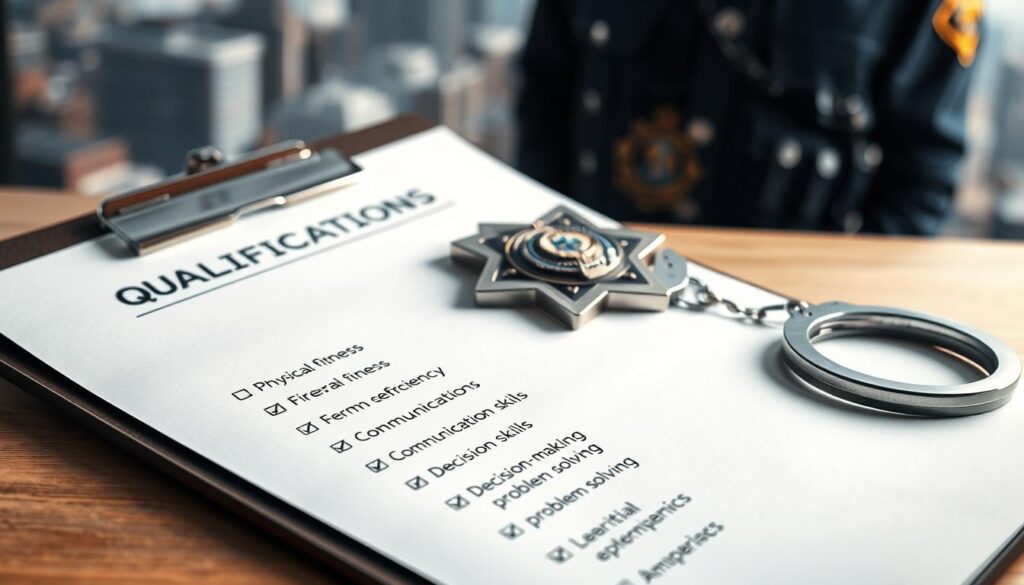Did you know only 12% of police applicants pass initial screenings in competitive regions? With departments like Illinois State Police requiring candidates to relocate statewide and Wheaton Police mandating bachelor’s degrees or military service, preparation matters more than ever. Your path to a badge demands precision – and modern solutions to match 2025’s evolving standards.
This guide cuts through the complexity. You’ll navigate age rules (20-35 depending on location), education benchmarks, and citizenship requirements with clarity. Real examples from Woodstock, Wheaton, and state-level agencies show exactly what recruiters want. But meeting basics isn’t enough – you need standout materials that survive applicant tracking systems and human reviews.
That’s where tools like RoboApply’s AI resume builder and ATS optimizer become career game-changers. Imagine auto-fixing resume keywords for each department or generating interview answers tailored to community policing trends. We’ll show how to use these features strategically while maintaining your unique voice.
Key Takeaways
- Age and education requirements vary significantly between departments
- Military experience often substitutes for degree requirements
- Applicant tracking systems filter 75% of resumes before human review
- Location flexibility increases hiring chances in state-level roles
- AI tools optimize application materials for specific agencies
Overview of the 2025 Police Officer Job Landscape
Modern police departments now use nine-step screening processes to identify top candidates. Illinois State Police requires:
- Pre-Employment Application
- Physical Fitness Test (PFIT)
- Recruitment Examination
- 28-week Academy Training
Understanding the Recruitment Process
Timing matters. Most agencies take 6-12 months from application to academy start. Woodstock PD prioritizes service backgrounds – military veterans or criminal justice graduates get +5 preference points. Use tools like RoboApply’s resume builder to highlight these qualifications early.
Key Eligibility and Pre-Employment Requirements
Age limits vary sharply. Woodstock requires 21-34 years, while Wheaton accepts candidates up to 40 with specialized skills. Three non-negotiable requirements:
- Clean criminal record (felony-free)
- 20/20 corrected vision
- Valid driver’s license
For complex eligibility rules, review state-specific guidelines. Departments now weigh community engagement as heavily as physical fitness – tailor your application accordingly.
How to Land a Police Officer Job in 2025 with RoboApply
Managing multiple police department requirements demands precision. RoboApply’s AI resume builder transforms generic experience into agency-specific narratives. For example, Illinois State Police’s online application process prioritizes crisis management skills – the tool automatically surfaces relevant training from your background.

The ATS optimizer tackles a critical hurdle: 82% of applications get rejected by automated filters. It scans job descriptions for keywords like “community engagement” or “incident reporting,” then adjusts your materials accordingly. Woodstock PD’s strict deadline system becomes manageable with the job tracker, which syncs testing dates and document requirements across jurisdictions.
Integrating RoboApply's AI Resume Builder and ATS Optimizer
Three ways this combination accelerates results:
- Time-sensitive adjustments: Wheaton’s structured timeline requires updated materials every 45 days – the platform alerts you
- Competency matching: Auto-formats military service into leadership equivalents for departments valuing veterans
- Error prevention: Grammar checks ensure flawless submissions, critical for background check compliance
Analytics reveal which applications progress fastest, letting you refine strategies. One user reported 3x more interviews after using the outreach CRM to maintain contact with Illinois recruiters. For security officer cover letters, the system suggests phrasing that aligns with 2025’s focus on de-escalation tactics.
Crafting a Winning Resume for a Police Career
Your resume is your first patrol shift in the hiring process – it needs to demonstrate both precision and purpose. Departments like Illinois State Police scan for specific documentation: transcripts, military discharge papers (DD-214), and law enforcement certifications. Missing one item could land your application in the rejection pile.
Utilizing RoboApply's AI-Powered Tools
RoboApply’s resume builder transforms generic experience into agency-ready narratives. The system auto-formats your military service as leadership training – crucial for departments prioritizing veterans. For example:
“Managed 15-person security team” becomes “Directed critical incident response protocols for 500+ personnel.”
The grammar checker eliminates errors that might suggest carelessness – a red flag for police recruiters. One user fixed 12 typos in their firearms certification section using this feature.
Optimizing for Applicant Tracking Systems
ATS filters reject 75% of applicants before human review. RoboApply’s optimizer scans job descriptions for phrases like “community engagement” or “crisis management,” then adjusts your content. When Wheaton PD listed “evidence documentation” as key, the tool highlighted related skills from a retail worker’s background:
- Inventory tracking → Evidence chain-of-custody procedures
- Conflict resolution → De-escalation technique application
For specialized roles, create multiple resume versions in minutes. A K9 unit officer candidate emphasized canine first aid training using customizable templates – landing three interviews in two weeks.
Essential Skills and Qualifications for Law Enforcement
Your toolkit for law enforcement success needs more than handcuffs and a badge. Departments now demand verified competencies that match 2025’s community-focused policing models. Let’s break down what gets applications noticed.

Technical Certifications and Physical Fitness
Illinois State Police sets clear requirements: 60 college credit hours (C average), military service with campaign medals, or 3 years in enforcement. Physical benchmarks include:
- 1.5-mile run under 14:26 minutes
- 25+ bench presses at 84% body weight
- 18.5-inch sit-and-reach flexibility test
Certifications like EMT licenses or crisis negotiation training add level-specific value. Document these using RoboApply’s skills mapper to auto-match agency priorities.
Soft Skills and Communication Competencies
De-escalation tactics now account for 40% of Chicago PD’s oral interviews. Train with scenarios like:
- Mediating neighborhood disputes
- Explaining legal processes in plain language
- Adapting communication for neurodiverse individuals
Cultural sensitivity training hours matter – Illinois agencies track this through professional development logs. Update yours quarterly.
Medical standards are non-negotiable. Prepare for vision tests requiring 140-degree peripheral awareness and hearing exams detecting 25 dB tones at 500-4000 Hz. Veterans: highlight qualifying medals like the Global War on Terrorism Service Medal during credit evaluations.
Navigating the Police Officer Application Process
Mastering multi-stage hiring systems requires strategic planning. Illinois State Police and municipal departments like Woodstock use layered evaluations to identify top talent. Follow this roadmap to avoid missteps.
Step-by-Step Application and Testing Procedures
Phase 1: Documentation Prep
Illinois State Police demand three core items: college transcripts (minimum 60 credits), military DD-214 forms, or law enforcement certificates. Woodstock adds a $250 non-refundable fee with applications – submit via certified mail for tracking.
Phase 2: Fitness & Written Exams
Schedule PFIT testing immediately after application submission. Illinois’ protocol includes:
- 1.5-mile run (under 14:26 minutes)
- 27+ bench presses at 84% body weight
- Sit-and-reach flexibility assessment
Woodstock’s written exam covers constitutional law and report writing. Study guides cost $45 through their training portal.
Phase 3: Background & Interviews
Investigators verify 10-year employment history and contact all listed references. Wheaton’s panel interviews focus on scenario responses – practice de-escalation roleplays using structured answer formats.
Final Steps: Medical & Academy
Conditional offers hinge on vision/hearing tests and psychological evaluations. Successful candidates start Illinois’ 28-week academy with firearms training and emergency driving modules.
Preparing for Oral Interviews and Practical Exams
Your final hurdle before academy admission demands equal parts mental agility and physical stamina. Illinois agencies like Wheaton PD and the State Police use layered evaluations to assess both your critical thinking and endurance. 
Mastering Two-Stage Interview Challenges
Illinois State Police’s oral interview combines individual Q&A with panel presentations. You’ll face questions from a Merit Board member and Colonel, then deliver a structured response to community policing scenarios. RoboApply’s interview coach analyzes your practice answers using law enforcement rubrics, suggesting improvements like:
- Incorporating department-specific initiatives (e.g., Wheaton’s youth mentorship programs)
- Balancing procedural knowledge with emotional intelligence
- Timing responses to stay within 3-minute limits
For written assignments, create templates addressing common themes: use-of-force policies, conflict resolution frameworks, and crisis communication strategies.
PFIT Training That Beats Minimums
Successful candidates don’t just meet benchmarks – they exceed them. Illinois’ Physical Fitness Test (PFIT) requires:
- 1.5-mile run (aim for sub-13:30 vs. 14:26 minimum)
- 30+ bench presses at 84% body weight
- 20-inch sit-and-reach flexibility
Build endurance with interval training: alternate sprinting and jogging every 200 meters. Strengthen core muscles through planks (3 sets of 90 seconds) to boost sit-up counts. Veterans: document qualifying medals early using automated resume tools to claim preference points.
Final tip: Record mock interviews weekly. Analyze body language and vocal clarity – 72% of evaluators note these factors within the first 90 seconds.
Leveraging RoboApply's Advanced Tools for Application Success
Streamline your law enforcement job search with tools designed for today’s competitive hiring landscape. RoboApply’s Auto-Apply Chrome Extension eliminates manual data entry – it populates application fields in seconds while you browse police department sites. The Job Tracker syncs deadlines across multiple agencies, sending alerts 72 hours before written exams or fitness tests.
Maximizing Efficiency with Automated Solutions
Three critical benefits emerge when combining these features. First, the extension auto-fills repetitive details like addresses and certifications, reducing errors in time-sensitive submissions. Second, the tracker’s dashboard color-codes applications by status – green for interviews scheduled, yellow for pending background checks.
For candidates balancing multiple roles, like private investigators seeking police transitions, tools like this investigator resume builder ensure consistent quality across applications. Real-time analytics show which departments respond fastest, letting you prioritize follow-ups strategically.
These solutions transform scattered efforts into focused campaigns. You’ll maintain momentum through lengthy hiring processes while meeting strict agency requirements – a decisive edge in 2025’s law enforcement job market.
FAQ
What’s the maximum age limit for police officer applicants?
Most agencies require candidates to be at least 21 years old, with maximum age limits varying by state (typically 35-40). Military veterans often receive age-limit extensions through preference points. Always verify local requirements before applying.
How long does the police academy take to complete?
Training programs typically last 12-26 weeks, combining classroom instruction with physical fitness testing. Some departments offer paid academy positions, while others require self-funded completion before hiring.
Can a felony conviction disqualify me from law enforcement careers?
Yes – all agencies require clean criminal records. Misdemeanor charges may require case-by-case review during background checks. Domestic violence convictions permanently disqualify candidates under federal law.
What medical exams are required for police recruitment?
Candidates must pass vision/hearing tests, drug screenings, and cardiovascular assessments. Psychological evaluations assess stress tolerance and decision-making under pressure. Chronic conditions affecting job performance may disqualify applicants.
How do preference points work in police hiring?
Veterans, bilingual candidates, and residents often receive 5-10% score boosts on written exams. Document military service (DD214) or language certifications early in the application process to claim eligible credits.
What’s included in the oral interview phase?
Panel interviews assess situational judgment through scenario-based questions. Prepare examples demonstrating conflict resolution, ethical decision-making, and community engagement. RoboApply’s mock interview simulator provides real-time feedback on responses.
Do police departments require college degrees?
While 60+ college credits are preferred by urban agencies, rural departments may only require a high school diploma. Criminal justice degrees or emergency medical certifications strengthen applications through demonstrated knowledge.
How does the background check process work?
Investigators verify 7-10 years of employment history, financial records, and personal references. Disclose all prior addresses, international travel, and social media accounts. Omissions constitute automatic disqualification.


















